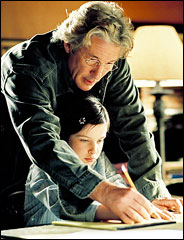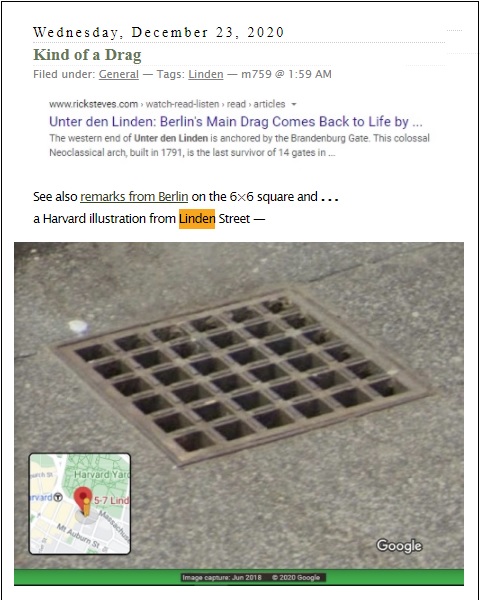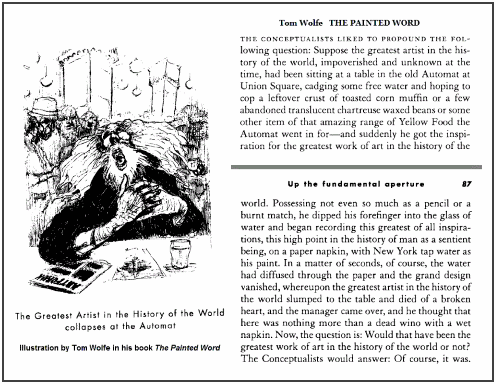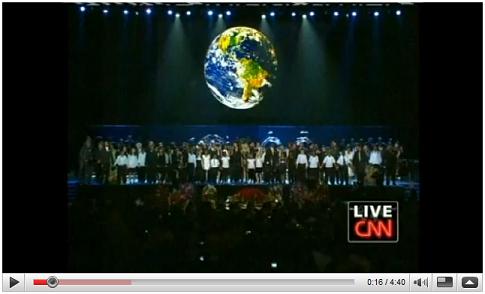Related remarks: “Bee Season” in this journal.
Saturday, January 30, 2021
Thursday, March 12, 2020
Saturday, December 15, 2018
Bee Season continues.
Tuesday, February 14, 2017
Bee Season Continued
“Spells are used for breaking enchantments as well as for inducing them.”
— C. S. Lewis, quoted here during November 2005.
A review of that month was suggested by the following search …
… which itself was suggested by an obituary in tonight’s online
New York Times and by this morning’s post “Rhyme.”
Friday, September 12, 2014
Bee Season
Quiz:
Spell the name of the race of intelligent horses in Gulliver’s Travels .

Scarlett Johansson and friend in “The Horse Whisperer” (1998)
Some context: “Bee Season” in this journal.
Saturday, January 30, 2021
Associative Logic
The co-ed Delphic-Bee Club will split into the all-male Delphic Club
and the all-female Bee Club three years after merging, according to
club affiliates.

See also the previous post, “Bee Season.“
Sunday, December 30, 2018
Mechanical Parable
Raiders of the Lost Crucible and Bee Season continue …
"Walter Kerr, in his 1953 review in the New York Herald Tribune ,
wrote, 'The Crucible , which opened at the Martin Beck Thursday,
…seems to me to be taking a step backward into mechanical parable,
into the sort of play which lives not in the warmth of humbly observed
souls but in the ideological heat of polemic.' For Kerr, Miller’s play is
an analytical argument, a treatise, rather than a heartfelt play about
human lives."
— http://www.americanpopularculture.com/
archive/bestsellers/authur_miller.htm
A more heartfelt approach —
" … this beautiful love story . . . ."
Wednesday, August 30, 2017
Horn and Hard Art
Or: Bee Season Continues
Click the automat image above to enlarge.
Click the Horn & Hardart image below for the source.
See as well Catskills Heaven (Log24 on August 20, 2017) —
The Coen brothers, 2007 screenplay —

(From a novel by Cormac McCarthy)
Tuesday, February 14, 2017
Rhyme
For the late poet Thomas Lux ,
who reportedly died on February 5
(See posts tagged Bewitchment) —
"A darker riddle with no answer looms . . . .
For those who linger on among the tombs"
— John Hollander, from a poem in A Draft of Light
Those who enjoy dark riddles with no answers
may search the Web for "Sefer Yetzirah" + Cube.
I prefer a purely mathematical approach to the cube.
Saturday, December 7, 2013
For the X-Men of St Andrews…

… and Little Colva—
Two links on a Jewish approach to such matters:
Bee Season and, more generally, Kabbalah.
Thursday, April 7, 2011
Brightness at Noon (continued)
Raiders of the Lost Tree— See Spelling the Tree, by Robert de Marrais.
See also "Bee Season" in this journal.
Wednesday, August 5, 2009
Wednesday August 5, 2009
"Edward T. Hall, a cultural anthropologist
who pioneered the study of nonverbal
communication and interactions between
members of different ethnic groups,
died July 20 at his home in
Santa Fe, N.M. He was 95."
NY Times piece quoted here on
the date of Hall's death:
|
"July 20, 1969, was the moment NASA needed, more than anything else in this world, the Word. But that was something NASA's engineers had no specifications for. At this moment, that remains the only solution to recovering NASA's true destiny, which is, of course, to build that bridge to the stars." Commentary — |
"Mr. Hall first became interested in
space and time as forms of cultural
expression while working on
Navajo and Hopi reservations
in the 1930s."
Log24, July 29:
|
"Kaleidoscope turning…
Shifting pattern within |
"We are the key."
— Eye of Cat
Paul Newall, "Kieślowski's Three Colours Trilogy"—
"Julie recognises the music of the busker outside playing a recorder as that of her husband's. When she asks him where he heard it, he replies that he makes up all sorts of things. This is an instance of a theory of Kieślowski's that 'different people, in different places, are thinking the same thing but for different reasons.' With regard to music in particular, he held what might be characterised as a Platonic view according to which notes pre-exist and are picked out and assembled by people. That these can accord with one another is a sign of what connects people, or so he believed."
The above photo of Juliette Binoche in Blue accompanying the quotations from Zelazny illustrates Kieślowski's concept, with graphic designs instead of musical notes. Some of the same designs are discussed in Abstraction and the Holocaust (Mark Godfrey, Yale University Press, 2007). (See the Log24 entries of June 11, 2009.)
Related material:
"Jeffrey Overstreet, in his book Through a Screen Darkly, comments extensively on Blue. He says these stones 'are like strands of suspended crystalline tears, pieces of sharp-edged grief that Julie has not been able to express.'….
Throughout the film the color blue crops up, highlighting the mood of Julie's grief. A blue light occurs frequently, when Julie is caught by some fleeting memory. Accompanied by strains of an orchestral composition, possibly her husband's, these blue screen shots hold for several seconds while Julie is clearly processing something. The meaning of this blue light is unexplained. For Overstreet, it is the spirit of reunification of broken things."
— Martin Baggs at Mosaic Movie Connect Group on Sunday, March 15, 2009. (Cf. Log24 on that date.)
For such a spirit, compare Binoche's blue mobile in Blue with Binoche's gathered shards in Bee Season.
Tuesday, July 7, 2009
Tuesday July 7, 2009
On June 25
in this journal–
A Word for AntiChristmas:“… T. S. Eliot tried to recompose,
in Four Quartets, the fragments he had grieved over in The Waste Land.” — “Beauty and Desecration,” |
Today’s word
(thanks to Michael Jackson)–
| From Log24 on Nov. 12, 2005:
“‘Tikkun Olam, the fixing of the world,’ she whispers. ‘I’ve been gathering up the broken vessels to make things whole again.'” — Miriam in Bee Season
“Tikkun Olam, the gathering of the divine fragments, is a religious activity…. How do we work for the repair of the world? If we live in a humpty dumpty world, how do we get it all put back together again?”
— A Sunday Sermon “… the
— Martha Cooley, The Archivist |
Friday, March 2, 2007
Friday March 2, 2007
Goddess vs. Alphabet
| "I was reading Durant's section on Plato, struggling to understand his theory of the ideal Forms that lay in inviolable perfection out beyond the phantasmagoria. (That was the first, and I think the last, time that I encountered that word.)" |
Part I: Phantasmagoria


Photo by Phil Bray
Transcendence through spelling:
Richard Gere and Flora Cross
as father and daughter
in the film of Bee Season.
"Every aspect of the alef's
construction has been
Divinely designed
to teach us something."
— Alef– The Difference Between
Exile And Redemption,
by Rabbi Aaron L. Raskin
Related material–
Art Theory for Yom Kippur
and
Log24 entries, Nov. 2005.
Part II: Hunt for the Real
The Alphabet Versus the Goddess:
The Conflict Between Word and Image.
See also the references
to Zelazny's Eye of Cat
in the Nov. 2005 entries
as well as
today's previous entry—
with the Norton Simon motto
"Hunt for the best"– and…
— Arthur Lubow in The New York Times, Feb. 25, 2007
Friday, June 2, 2006
Friday June 2, 2006
“Float like a butterfly,
sting like a bee.”
— Muhammad Ali
Related material:
Log24 on the
Feast of the Transfiguration
(Aug. 6, 2002) and
Bee Season
(Nov. 12, 2005,
with the four entries
that preceded it).
See also
Spelling Champ
Masters “Ursprache.”
Tuesday, January 10, 2006
Tuesday January 10, 2006
(continued)
From Nov. 12, 2005:
“Follow the spiritual journey
that is BEE SEASON.“

“‘Tikkun Olam,
the fixing of the world,’
she whispers. ‘I’ve been
gathering up the broken vessels
to make things whole again.'”
From Nov. 14, 2005:
|
Culture Wars
‘Chicken Little’ Lays Golden Egg (Dean Goodman, Reuters) ‘Bee Season’ Anxiety
The mixed bag of limited release preems was highlighted by an excellent response to the concert film Sarah Silverman: Jesus is Magic. The film recorded a $19,000 plus per engagement average from seven outings for a $130,000 gross. The family drama Bee Season had a comparable gross but on three times as many screens that translated into anxiety about the Richard Gere film’s expansion prospects.
|
Today’s vocabulary lesson:
A search on the related adjective “hendiadic”
leads to an insightful discussion of
religion and law
in contemporary Latin America
by Antônio Flávio Pierucci.
For other material on
Latin America and religion
from Robert Stone and
Nythamar Fernandes de Oliveira,
see the Jan. 25, 2005, entry
Diamonds Are Forever.
Related material:
Yesterday’s link for Nixon’s birthday
led to an obituary of a Marxist
writer that concluded as follows:
“In 2004, Mr. Magdoff wrote about his friendship with Che Guevara, one of his revolutionary heroes. At what proved to be their final meeting before Mr. Guevara’s death in 1967, Mr. Magdoff asked what he could do to help Cuba. ‘Keep on educating me,’ was the response.”
I recommend the writings of
Pierucci, Stone, and Oliveira,
but not those of Magdoff.
Monday, November 14, 2005
Monday November 14, 2005
Culture Wars
‘Chicken Little’ Lays Golden Egg
(Dean Goodman, Reuters)
‘Bee Season’ Anxiety
(Leonard Klady, Movie City News):
Nov. 11-13, 2005
| Title |
Gross (average)
|
Theaters
|
Cume
|
| Chicken Little |
32.7 ( 8,950)
|
3658
|
81.5
|
| Sarah Silverman: Jesus is Magic |
0.13 (19,210)
|
7
|
0.13
|
| Bee Season |
0.13 ( 6,280)
|
21
|
0.13
|
Sunday, November 13, 2005
Sunday November 13, 2005
“Sunrise–
Hast thou a Flag for me?”
— Emily Dickinson
From a
Beethoven’s Birthday entry:


Kaleidoscope turning…
Shifting pattern
within unalterable structure…
— Roger Zelazny, Eye of Cat
Related material:
Blue
(below),

Bee Season
(below),

Halloween Meditations,
Aquarius Jazz,
We Are the Key,
and
Jazz on St. Lucia’s Day.
“Y’know, I never imagined
the competition version involved
so many tricky permutations.”
— David Brin, Glory Season
Saturday, November 12, 2005
Saturday November 12, 2005
“Follow the spiritual journey
that is BEE SEASON.“

“‘Tikkun Olam,
the fixing of the world,’
she whispers. ‘I’ve been
gathering up the broken vessels
to make things whole again.'”
— Miriam in Bee Season
of the divine fragments,
is a religious activity….
How do we work for
the repair of the world?
If we live in a
humpty dumpty world,
how do we get it all
put back together again?”
“… the tikkun can’t start until
everyone asks what happened–
not just the Jews but everybody.
The strange thing is that
Christ evidently saw this.”
— Martha Cooley, The Archivist
“She understands that Bloom asked for breakfast in bed. Since we were present when Bloom fell asleep and he had not asked for breakfast in bed before he fell asleep, Molly may have misunderstood his sleepy murmurs about the Roc’s egg.”
Jorn Barger on Finnegans Wake:
“Acknowledging the dream as sexually harrowing, we’re offered relief in a view of ALP as a hen scratching up battle-relics from a midden heap after the fall/Flood.
Saturday November 12, 2005
"…his eyes ranged the Consul's books disposed quite neatly… on high shelves around the walls: Dogme et Ritual de la Haute Magie, Serpent and Siva Worship in Central America, there were two long shelves of this, together with the rusty leather bindings and frayed edges of the numerous cabbalistic and alchemical books, though some of them looked fairly new, like the Goetia of the Lemegaton of Solomon the King, probably they were treasures, but the rest were a heterogeneous collection…."
— Malcolm Lowry, Under the Volcano, Chapter VI
"… when Saul does reach for a slim leather-bound volume Eliza cannot help but feel that something momentous is about to happen. There is care in the way he carries the book on the short journey from its shelf, as if it were constructed not of leather and parchment but of flesh and blood….
"Otzar Eden HaGanuz," Saul says. "The Hidden Eden. In this book, Abulafia describes the process of permutation…. Once you have mastered it, you will have mastered words, and once you have mastered words, you will be ready to receive shefa."
"In the Inner Game, we call the Game Dhum Welur, the Mind of God."
— The Gameplayers of Zan, a novel featuring games based on cellular automata
"Regarding cellular automata, I'm trying to think in what SF books I've seen them mentioned. Off the top of my head, only three come to mind:
The Gameplayers of Zan M.A. Foster
Permutation City Greg Egan
Glory Season David Brin"
— Jonathan L. Cunningham, Usenet
"If all that 'matters' are fundamentally mathematical relationships, then there ceases to be any important difference between the actual and the possible. (Even if you aren't a mathematical Platonist, you can always find some collection of particles of dust to fit any required pattern. In Permutation City this is called the 'logic of the dust' theory.)….
… Paul Durham is convinced by the 'logic of the dust' theory mentioned above, and plans to run, just for a few minutes, a complex cellular automaton (Permutation City) started in a 'Garden of Eden' configuration — one which isn't reachable from any other, and which therefore must have been the starting point of a simulation…. I didn't understand the need for this elaborate set-up, but I guess it makes for a better story than 'well, all possible worlds exist, and I'm going to tell you about one of them.'"
— Danny Yee, review of Permutation City
"Y'know, I never imagined the competition version involved so many tricky permutations."
— David Brin, Glory Season, 1994 Spectra paperback, p. 408

|
Figure 2
"… matter is consciousness expressed in the intermixing of force and form, but so heavily structured and constrained by form that its behaviour becomes describable using the regular and simple laws of physics. This is shown in Figure 2. |
Figure 3
"This quaternary is a Kabbalistic representation of God-the-Knowable, in the sense that it the most abstract representation of God we are capable of comprehending…. — A Depth of Beginning: Notes on Kabbalah by Colin Low (pdf) |
See also
Cognitive Blending and the Two Cultures,
Mathematics and Narrative,
Deep Game,
and the previous entry.
Friday, November 11, 2005
Friday November 11, 2005
(continued)

Transcendence through spelling:
Richard Gere and Flora Cross
as father and daughter
in "Bee Season."
Words Made Flesh: Code, Culture, Imagination—
… letters create things by the virtue of an algorithm…
— Sefer Yetzirah
Spelling is a sign, Elly. When you win the national bee, we'll know that you are ready to follow in Abulafia's footsteps. Once you're able to let the letters guide you through any word you are given, you will be ready to receive shefa."
In the quiet of the room, the sound of Eliza and her father breathing is everything.
"Do you mean," Eliza whispers, "that I'll be able to talk to God?"

Diamond Theory notes
of Feb. 4, 1986,
of April 26, 1986, and
of May 26, 1986,
Sacerdotal Jargon
(Log24, Dec. 5, 2002),
and 720 in the Book
(Log24, Epiphany 2004).











